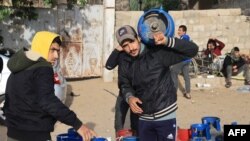Seventy more aid trucks entered Gaza from Egypt's Rafah border crossing Saturday, day two of a truce between Israel and the Hamas militia group that controls Gaza.
Observers along Egypt's Rafah border crossing leading to the Hamas-controlled Gaza Strip say that more than 70 fuel and aid supply trucks had entered Gaza from Egypt by midafternoon Saturday. A Hamas spokesman told Qatar's Al Jazeera TV that food, fuel, water and medical supplies were among the main items entering Gaza.
The second phase of a prisoner and hostage swap between Israel and Hamas was also in the process of being implemented Saturday afternoon, as Israel released 42 more Palestinian prisoners from its detention centers. Hamas was expected to hand over 14 Israelis to Egypt.
A Palestinian human rights observer in the West Bank, Qaddoura Farris, said at a press conference that the prisoner swap was "unfair" because Israel chose the names of those Palestinians it was releasing in exchange for hostages that it had selected. VOA could not independently confirm the claim.
He said that Israel did not respect the principle of prisoner exchanges that the longest-serving prisoners are released first.
Israeli Prime Minister Benjamin Netanyahu, for his part, said on social media platform X, formerly Twitter, that he was determined to bring back all Israeli hostages, whatever the circumstances.
"We just completed the return of the first of our hostages: children, their mothers and additional women,” he said. “Each of them is an entire world. But I emphasize to you, the families, and to you, citizens of Israel, we are committed to returning all the hostages. This is one of the aims of the war, and we are committed to achieving all the aims of the war."
A Hamas spokesman in Gaza, Taher Nounou, also complained to Qatar's al Jazeera TV that Israel was not allowing more than about three aid trucks into northern Gaza, which could put the current four-day truce "in jeopardy."
Israel has indicated previously that it was opposed to sending fuel and other aid supplies that would ultimately end up in the hands of Hamas rather than the civilian population for which it was intended.




